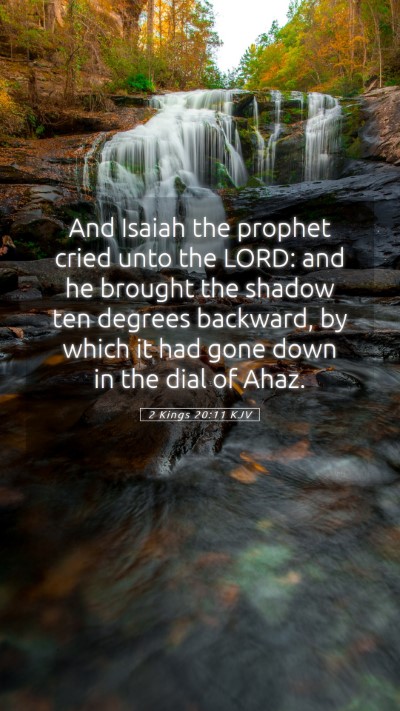Old Testament
Genesis Exodus Leviticus Numbers Deuteronomy Joshua Judges Ruth 1 Samuel 2 Samuel 1 Kings 2 Kings 1 Chronicles 2 Chronicles Ezra Nehemiah Esther Job Psalms Proverbs Ecclesiastes Song of Solomon Isaiah Jeremiah Lamentations Ezekiel Daniel Hosea Joel Amos Obadiah Jonah Micah Nahum Habakkuk Zephaniah Haggai Zechariah Malachi2 Kings 20:11 Meaning
What is the meaning of 2 Kings 20:11?
And Isaiah the prophet cried unto the LORD: and he brought the shadow ten degrees backward, by which it had gone down in the dial of Ahaz.
2 Kings 20:11 Bible Verse Meaning
Understanding 2 Kings 20:11
2 Kings 20:11 states, "And Isaiah the prophet cried unto the Lord: and he brought the shadow ten degrees backward, by which it had gone down in the dial of Ahaz." This verse depicts God's miraculous intervention in response to King Hezekiah's prayer for healing. The verse is significant in understanding the relationship between divine authority and human supplication.
Commentary Insights
- Matthew Henry's Commentary:
Henry emphasizes the power of prayer and the faith of Hezekiah when faced with death. He notes that the act of turning back the shadow signifies God's control over time and nature. It was not only a sign of healing for Hezekiah but also a demonstration of God's covenant loyalty towards His people.
- Albert Barnes' Notes:
Barnes discusses the historical and prophetic implications of this miraculous sign, suggesting that it reinforced Hezekiah's faith and the legitimacy of Isaiah as God’s prophet. He highlights how this event was more than a miraculous act; it served as a confirmation of God's promises and the importance of kings turning to God in their distress.
- Adam Clarke's Commentary:
Clarke provides a detailed examination of the mechanism of the sundial as a means of timekeeping in ancient Israel. He explains that the miraculous backward movement of the shadow serves as an unprecedented sign from God. Clarke also muses on the implications of such an event for understanding God's sovereignty and power over time, reinforcing that all natural laws are subject to divine will.
Key Themes
- Divine Intervention:
This verse showcases God's readiness to respond to the pleas of His people. The changing of the shadow serves as a powerful testament to God's ability to alter reality itself for the sake of those who seek Him in faith.
- Prayer and Faith:
Hezekiah's earnest prayer was met with a direct reply from God, illustrating the importance of faith in seeking divine assistance. It suggests that sincere prayer can lead to miraculous outcomes.
- Prophetic Assurance:
The narrative reinforces the role of the prophet as God's spokesperson. Isaiah’s involvement shows how God communicates His will and takes action through chosen messengers.
Application and Relevance
This verse encourages believers to bring their problems before God, emphasizing the power of prayer and divine intervention in their lives. It provides a framework for understanding how faith can lead to miraculous changes, and it reassures that God is actively involved in the temporal affairs of humanity.
Moreover, it can be a point of reflection during Bible study groups or personal study, prompting discussions on how to apply biblical truth when faced with life's challenges.
Cross References
- Isaiah 38:1-5: This passage recounts the same miraculous healing and serves as the immediate context for Hezekiah's plea.
- James 5:16: This verse highlights the power of prayer, reinforcing the principal biblical theme of seeking God in times of need.
- Exodus 14:21-22: Here, God demonstrates His power over nature by parting the Red Sea, paralleling the miraculous intervention in Hezekiah's story.
Conclusion
In conclusion, 2 Kings 20:11 is a profound verse reflecting the themes of divine intervention, the power of prayer, and the assurance found in God's promises. The insights provided by various commentaries offer a rich tapestry of understanding for both scholars and casual readers seeking to deepen their Bible verse interpretations and understanding Scripture.


